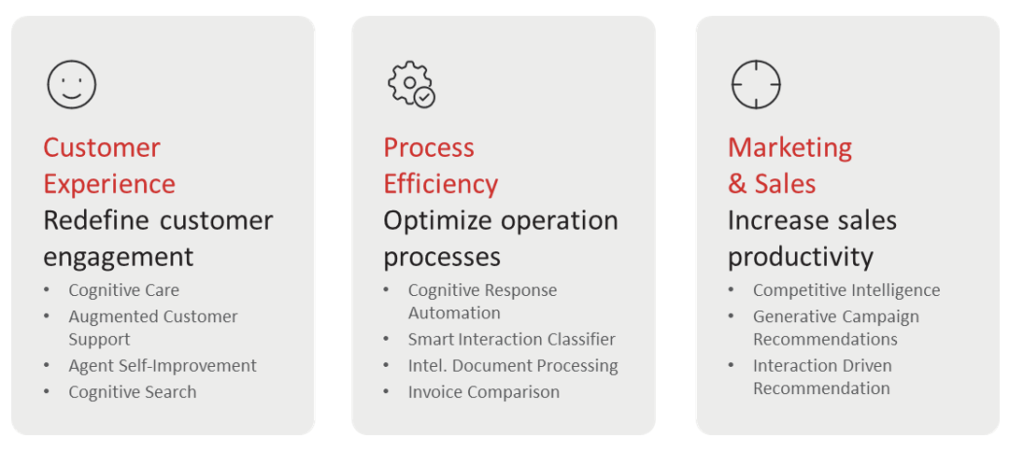Partner content: In a digital landscape, AI-driven automation is essential for maintaining competitiveness and operational efficiency
AI ecosystems are intricate networks of algorithms, data, and technologies that drive intelligent decision-making and automation. As businesses increasingly leverage AI and Generative AI to optimise processes, enhance productivity, and foster innovation, scaling these solutions presents challenges and requires alignment with real-world needs.
Driving efficiency and innovation in the digital era
In today’s fast-paced environment, businesses face a huge amount of pressure to achieve greater efficiency while staying competitive in an ever-evolving market. To meet these challenges, organisations are increasingly turning to AI-driven solutions to optimise their operations. Leveraging cutting-edge technologies such as AI and Generative AI, businesses can transform their processes – automating repetitive tasks, integrating insights from diverse data formats, and streamlining workflows.
These solutions go beyond mere automation; they focus on solving business challenges. By reducing operational complexities and enhancing productivity, companies can allocate their resources more strategically. Whether it’s accelerating the development of new offerings, reducing errors in routine operations, or improving responsiveness to market demands, AI-powered strategies enable businesses to remain agile and future-ready.
These solutions can go from Competitive Intelligence capabilities, made to help marketeers identifying competitor offers by automatically crawling commercial offers and campaigns from the website and social networks; to Claims Automation capabilities, to optimise the claims analysis phase, reducing time and effort in claims processing.
Ultimately, this approach allows organisations to innovate faster, respond smarter, and thrive in a data-driven economy.
Below are some key benefits of AI-driven solutions:
- Enhanced Productivity – AI automates repetitive tasks, allowing employees to focus on higher-value activities that drive innovation and growth.
- Operational Cost Reduction – by streamlining workflows and reducing manual interventions, AI helps lower operational expenses and improve cost efficiency.
- Data-Driven Decision Making – AI-powered insights help businesses make informed decisions faster, leveraging diverse data formats for deeper analysis and strategic planning.
- Improved Accuracy and Reduced Errors – automating tasks minimises human errors, ensuring greater precision in processes such as data entry, claims processing, and compliance management.
- Faster Innovation and Adaptability – AI enables businesses to quickly implement new use cases and respond to market changes with agility, maintaining a competitive edge.
- Scalability and Flexibility – AI solutions can scale with business needs, seamlessly adapting to growing demands without compromising efficiency.
- Enhanced Customer Experience – AI-driven automation improves response times, personalises customer interactions, and enhances overall service quality.
(Gen) AI & AI Challenges
The rapid adoption of AI and Generative AI technologies has created transformative opportunities for businesses to enhance their efficiency and achieve new levels of innovation. However, while the potential is immense, many organisations struggle to realise tangible value from their investments in AI. The challenge lies not only in deploying AI solutions but also in ensuring that these tools deliver measurable business outcomes, scale effectively, and align with strategic objectives.
As companies explore AI’s potential, they face questions about profitability, reliability, and scalability. Many enterprises find themselves navigating obstacles such as high implementation costs, fragmented processes, data availability, and uncertainty about AI’s integration into their operational workflows. Addressing these challenges is critical for turning AI from a high-cost experimental tool into a driver of business value.
Today, the challenges associated with AI Business Efficiency can be summarised in one question: Is my organisation ready to scale AI and Generative AI to deliver measurable business value?
Common Business Leader’s Questions:
- How can we ensure that Generative AI solutions generate tangible business value and are not just experimental projects?
- What are the main barriers to scaling Generative AI across enterprise environments, and how do we overcome them?
- How can we ensure the reliability, consistency, and accuracy of AI-generated outputs, particularly in critical business use cases?
- How do we align AI initiatives with our organisation’s strategic goals, while keeping implementation costs and risks under control?
Addressing these questions requires a thoughtful strategy to optimise AI implementation, focusing on scalability, governance, and alignment with business outcomes to ensure Generative AI becomes a reliable engine for enterprise efficiency and growth.
Strategic AI Deployment: Celfocus’s Approach
Celfocus aims to empower organisations by leveraging AI and Generative AI to transform business operations, ensuring these technologies are strategically deployed to drive measurable value. Our approach is focused on understanding the unique challenges and opportunities within each business, starting with an assessment of whether there is a clear business case for utilising AI and Generative AI capabilities.
AI use cases can be categorised into three main domains to address specific business needs:
- Customer Experience – redefining customer engagement through personalised, AI-driven interactions that enhance satisfaction and loyalty.
- Process Efficiency – streamlining operational processes by automating repetitive tasks, optimising workflows, and reducing costs.
- Marketing & Sales – boosting sales productivity by enabling smarter targeting, forecasting, and campaign management through AI-driven insights.

By following a composable architecture approach, it is ensured that AI solutions are designed to meet the specific needs of each business case, emphasising scalability, agility, and cost optimisation. Celfocus supports its clients by integrating AI seamlessly into their existing processes, providing a foundation for reliable and scalable adoption.
Three Pillars of our AI Business Efficiency view:
- Business Case Validation begins by identifying and validating the business case for AI use, ensuring clear alignment with organisational objectives and measurable outcomes.
- Flexible Implementation depending on the use case domain, we help organisations adopt and integrate AI capabilities across their ecosystems, including designing AI models, automating processes, and implementing AI-driven systems tailored to business needs.
- Governance and Reliability prioritises governance to ensure AI adoption is secure, ethical, and aligned with organisational goals.
Combining technology expertise with a deep understanding of business needs, it is ensured that AI and Generative AI become indispensable tools for driving efficiency, agility, and competitiveness in the modern enterprise. To achieve this, business leaders must focus on:
- Assess and Validate AI Business Use Cases – collaborate with stakeholders to evaluate and prioritise AI opportunities, ensuring alignment with strategic objectives and measurable business value.
- Develop Scalable AI Solutions – design and implement composable, cloud- or on-prem-based AI systems that integrate seamlessly into existing workflows, minimising complexity and maximising impact.
- Automate and Optimise Processes – enhance operational efficiency by automating repetitive tasks, streamlining workflows, and enabling AI-driven decision-making across business domains.
- Deliver AI-as-a-Service – develop mechanisms to expose and operationalise AI capabilities, such as APIs, automated decision systems, and pre-built models, for seamless integration into business processes.
- Accelerate Cultural and Business Adoption – promote the adoption of AI capabilities through targeted strategies, fostering confidence and alignment with organisational goals.
Unlocking AI’s Full Potential: From Challenges to Business Growth
As AI and Generative AI continue to reshape the business landscape, organisations must take a strategic approach to harness their full potential. Beyond automation, AI serves as a catalyst for innovation, enabling businesses to streamline operations, improve decision-making, and enhance customer experiences. However, the true value of AI lies in its ability to deliver measurable business outcomes, scale efficiently, and align with long-term strategic goals.
By addressing common challenges – such as implementation complexity, scalability, and governance – organisations can transform AI from an experimental tool into a powerful driver of efficiency and growth. Celfocus’s AI Business Efficiency approach ensures that AI solutions are not only technically sound but also business-driven, providing a structured pathway for companies to optimise processes, maximise ROI, and maintain a competitive edge in an increasingly data-driven economy.
With the right framework in place, businesses can unlock AI’s full potential, turning challenges into opportunities and paving the way for smarter, more agile, and future-ready enterprises.
About the authors
Amélia Goulão is responsible for the Data & Analytics Cognitive Offer at Celfocus. She started her career as a Business Intelligence Consultant at Celfocus, participating mostly in Financial Services projects. In 2016, she left Celfocus and joined a Data Science team. From 2016 to 2024, she developed several projects, grew and managed the team. In 2024, she joined back Celfocus and is now leading Cognitve Offer at Data & Analytics Business Line, designing the best solutions to help Celfocus’s customers achieve the best results.

Amélia has a vast experience in Data Science, Data Engineering, and Marketing Automation fields. Besides her professional experience, she has a Degree and Master Degree in Information Management.
Gonçalo Cachola is a Manager at Celfocus Data & Analytics Business Line. He spent his career conceiving and delivering high-value transformative data solutions with a track record in Telco and Insurance industries.
Currently, Gonçalo leads the Offer Development activities for Data & Analytics solutions focusing on creating next-generation analytics platforms to provide relevant insights and recommendations, covering both analytical and operational use cases.

Gonçalo is passionate about analysing and defining how businesses can operate, engage and support their customers using data-driven approaches.
He has in-depth knowledge and experience in Data Engineering, Data Visualisation and Marketing Automation technologies, having a Master Degree in Biomedical Engineering and a Postgraduate degree in Digital Marketing & Analytics.



